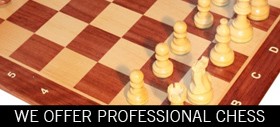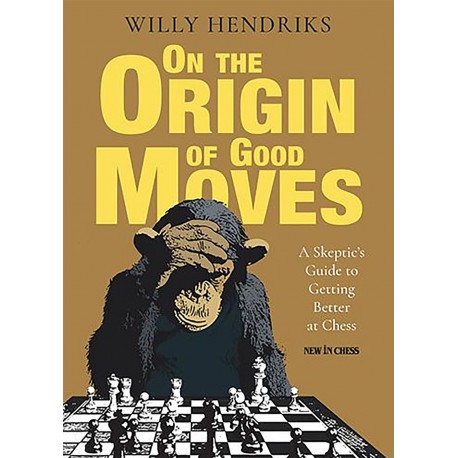No products
On the Origin of Good Moves: A Skeptic's Guide to Getting Better at Chess - Willy Hendriks (K-5827)
K-5827
New product
The way a beginner develops into a strong chess player closely resembles the progress of the game of chess itself. This popular idea is the reason why many renowned chess instructors such as former World Champions Garry Kasparov and Max Euwe, emphasize the importance of studying the history of chess.
- Write a review
Data sheet
| Language versions | English |
| Author / Authors | Willy Hendriks |
| Publisher | New In Chess |
| Year of Publication | 1st edition 2020 |
| Pages | 432 |
| ISBN | 9789056918798 |
| Hardcover | No |
| Paperback | Yes |
| Downloadable | No |
| Width | 17 cm / 6.69 inch |
| Height | 23.5 cm / 9.25 inch |
More info
Willy Hendriks agrees that there is much to be learned from the pioneers of our game. He challenges, however, the conventional view on what the stages in the advancement of chess actually have been. Among the various articles of faith that Hendriks questions is Wilhelm Steinitz's reputation as the discoverer of the laws of positional chess.
In The Origin of Good Moves Hendriks undertakes a groundbreaking investigative journey into the history of chess. He explains what actually happened, creates fresh perspectives, finds new heroes, and reveals the real driving force behind improvement in chess: evolution.
This thought-provoking book is full of beautiful and instructive ‘new’ material from the old days. With plenty of exercises, the reader is invited to put themselves in the shoes of the old masters. Never before has the study of the history of chess been so entertaining and rewarding.
International Master Willy Hendriks (1966) has been working as a chess trainer for over 25 years. His acclaimed bestseller Move First, Think Later won the English Chess Federation Book of the Year Award.
Reviews

Content
007 Explanation of symbols
009 Preface
015 1. Exercises for Chapter 1
016 Footnotes to Greco
025 2. Exercises for Chapter 2
027 The Nimzowitsch of the 17th century
039 3. Exercises for Chapter 3
040 With a little help from the opponent
056 4. Exercises for Chapter 4
058 First discussions: Philidor versus the Modenese masters
067 5. Exercises for Chapter 5
068 The start of serious competition
076 6. Exercises for Chapter 6
077 Staunton and the chess column as a second front
089 7. Exercises for Chapter 7
090 London 1851
105 8. Exercises for Chapter 8
106 Williams and the Wyvill formation
115 9. Exercises for Chapter 9
116 Murder at the seventh attempt
130 10. Questions for Chapter 10
132 Meanwhile in India
136 11. Exercises for Chapter 11
137 Blitzkrieg chess
144 12. Exercises for Chapter 12
145 A chivalrous battle in the open field
155 13. Exercises for Chapter 13
156 Anderssen versus Morphy: stereotypes upside down
163 14. Exercises for Chapter 14
164 The father of modern chess
174 15. Exercises for Chapter 15
175 From the coffeehouse to the arena
183 16. Attack at all costs
192 17. Exercises for Chapter 17
194 The art of positional play before Steinitz
208 18. Exercises for Chapter 18
209 The sword in one hand and the olive branch in the other
217 19. The Great Steinitz Hoax
219 20. The concept of balance
228 21. Exercises for Chapter 21
229 The elements of positional play
242 22. Exercises for Chapter 22
243 Of the dead, nothing but good
253 23. Exercises for Chapter 23
254 Before the endgame, the Gods have placed the middlegame
263 24. Exercises for Chapter 24
264 A pawn is worth a little trouble
272 25. Exercises for Chapter 25
273 The king can take care of itself
284 26. Lasker making history
293 27. Exercises for Chapter 27
295 Tarrasch versus Chigorin: the dialectic of theory and praxis
309 28. Exercises for Chapter 28
310 Back to the future
322 29. Exercises for Chapter 29
323 The test of time
334 30. Exercises for Chapter 30
335 Accumulating tactical ideas
346 31. Exercises for Chapter 31
347 The best plan is the absence of it
358 32. Exercises for Chapter 32
359 Study openings
369 33. Exercises for Chapter 33
371 A few bits of endgame knowledge
380 34. Exercises for Chapter 34
381 Revolution or evolution
396 35. Exercises for Chapter 35
397 Bottom-up development
410 36. Exercises for Chapter 36
411 On the origin of good moves
419 Endnotes
423 Index of names
427 Selected bibliography
















